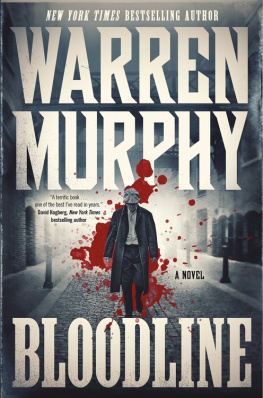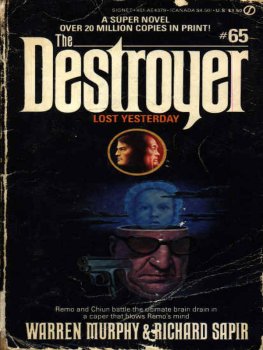***********************************************
* Title : #016 : OIL SLICK *
* Series : The Destroyer *
* Author(s) : Warren Murphy and Richard Sapir *
* Location : Gillian Archives *
***********************************************
CHAPTER ONE
"No greater enemy exists than one's own illusion of safety."-House of Sinanju.
He was a big one. Standing upright, he could reach the topmost branches and in one bite consume the terrified man-apes hiding there. A swat of his giant paw could crack the sabertooth's spine like a dried twig.
But nothing was dry here in the lush foliage, where each step oozed into muck and the very air steamed from the rich, tropical growth as Tyrannosaurus Rex thundered through the swamp.
In drier climates, others of his species would leave their bones for the descendants of the man-apes to piece together for their museums. But this would be thousands upon thousands upon thousands of years later, when the man-apes ruled the earth.
For now, the man-ape was only a tender morsel, scrambling desperately through the treetops, where branches touched and mingled.
Since Tyrannosaurus feared no enemy, he moved along without looking down, his eyes searching the branches for any man-apes too slow to have fled. Then a hind leg went into the muck just a little too deeply.
The danger signal flashed in the tiny, bird-sized brain. With his other hind leg, the giant animal tried to lift himself, but that leg sank even deeper.
As the creature sank, the small front paws grasped at a tree, but only tore it muck-sucking from its flooded roots. With a raging bellow, the Tyrannosaurus swallowed slime and then settled into the soft ooze.
One terrified man-ape, hidden in the treetop high above, watched as the huge hulk sank out of sight beneath him. His primitive brain wondered only briefly if there was any way he could get a piece of that massive meat, now sliding away from him. He soon forgot the thought.
No matter, the man-ape was alive for a while longer and what he did not know and could not perceive was that his own descendants, who would walk easily on two legs and who would not need the trees for protection, would need the Tyrannosaurus's body for survival more than he did. His descendants would fight and scheme and lie over the monster's body.
For even as the oxygen stopped coursing through the giant reptilian body, a strange chemical change was beginning. The body was beginning to rot, and along with smaller bodies and foliage it would decompose under great pressure, and over many thousands of years, these decomposed carbon-based bodies would form a black liquid called oil.
The black liquid moved under the earth as if alive. It passed easily through porous stones or openings, until it hit a cap of unporous rock that prevented it from moving upward. When water pressure from below prevented it from moving back downward, it became a stable, motionless, very accessible pocket of oil. All a man would have to do would be to sink a hole through the capstone and out would gush dark, black crude.
When that happened, the Tyrannosaurus's body would be indistinguishable from any other organisms, even the occasional body of the ape that would become man. They would all be crude oil, and because of a difference of merely pennies a barrel for their liquid remains, the industrialized world would almost manipulate itself into bankruptcy.
The ground above the particular pool of oil to which this Tyrannosaurus had contributed its remains gradually changed from swamp to jungle to sandy hot desert. The area became a Phoenician trading post, then a Roman city, then trackless desert again. Finally it was resurrected by Italians, whose presence and wealth attracted roaming Berber tribesmen.
In the Arab nationalism of the late twentieth century-according to Western measures of time-the land above the Tyrannosaurus's body became known as the Revolutionary People's Free Arab Republic. To most of the world it was still known as Lobynia, a name it had carried for centuries, until the deposing a few years before of its king, His Islamic Majesty Adras.
While new history books reported that the king had been deposed by the heroic struggles of the illustrious Arab people's revolutionary fervor, the great page in Arab heroism had been helped along by Seagram's Seven Whiskey.
The king's personal pilot, Pat Callahan of Jersey City, N.J., U.S.A., had been drunk the week of the revolution, and only the Lobynian Air Force's chief of staff, Muhammad Ali Hassan, was available to fly the king's jet from the Swiss health spa he had been visiting back to the Italian-named capital of Dapoli.
When King Adras heard that revolutionary forces were taking over the palaces and the Royal Lobynian Radio Station, he offered Callahan five thousand dollars in gold to put down his bottle of Seagram's Seven, sober up immediately, and fly him and his German bodyguards back to Lobynia.
"Oh, Majesty, I would be honored to fly you for nothing," said General Ali Hassan, chief of staff of the Lobynian Air Force.
"Ten thousand dollars," said King Adras to Callahan, who was trying to get to his knees.
"How much is that in rials?" asked Callahan, who had been working for the King for five years now. But before King Adras could answer, Callahan passed out in the hotel suite.
"I will fly you through storm and flak and over ocean and under clouds. I shall carry your royal majesty in grandeur like the eagle. I go where you command," said Air Chief of Staff Ali Hassan.
"Try going away from me," said the king, who had $250 million worth of Mirage jets rusting on Lobynian airfields, an investment made to show royal confidence in the Lobynian Air Force, whose leading pilot was none other than its commander, General Ali Hassan.
Hassan was so good, said his fellow Muslims, that he could almost fly a jet without a Frenchman as copilot. When Ali Hassan had made his first solo in a Piper Cub, Lobynia promptly bought the jets. They never touched a cloud again.
Thus, when his Air Force chief of staff was the only one capable of returning him-or, more accurately, willing to return him-to Lobynia, King Adras decided to reassert his royal presence by making a long-distance telephone call.
With the help of the Swiss national police, he finally got a call through to his palace.
A young colonel answered the phone.
"Where is my minister of defense?" asked the king.
"In jail," said the colonel.
"Where is the commander of my armies?"
"Fled to Morocco."
"Who are you?"
"Colonel Muammar Baraka."
"I don't remember you. Describe yourself."
"I scored highest on the entrance exam in the history of the royal military academy."
"I don't place you."
"I lead the Lobynian armor on your birthday parade."
"Oh, yes. The Italian-looking fellow."
"Correct."
"Well, you are now a general. I have just promoted you. Crush the rebellion. Shoot the traitors and dean the blood out of the palace before Friday." King Adras looked at the unconscious Callahan still clutching his bottle of Seagram's Seven. "Make that Saturday." he said.
"I am afraid I can't do that, your majesty."
"Why not?"
"I am the leader of the rebellion."
"Oh. I guess you're ready to face my German bodyguards?"
"They have no way of getting here and besides every man, woman, and child has lifted his voice in the revolution. We will tear you and your imperialist reactionary lackey to shreds. We will burn your eyes out, tear your limbs. Today we have taken the first step towards Arab glory and civilization."
"This doesn't mean a complete stop to my income, does it?"
"Not necessarily. A king who does not try to regain his crown can live very comfortably."
"May Allah bless the revolution."
Next page



